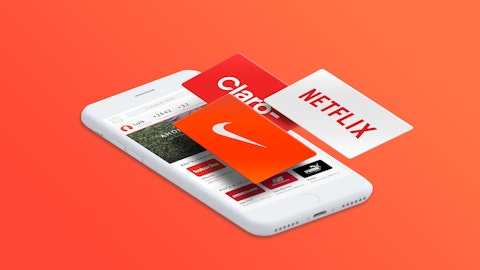Ever since blockchain technology was unveiled to the world, there is a lot of talk about its impact and the industries that it will revolutionize. Started as the technology that powers the popular cryptocurrency Bitcoin, blockchain is already making waves in the banking sector, the shipping industry. International Business Machines Corp (NYSE:IBM) is working closely with a number of banks to develop blockchain-based solutions for cheaper and more efficient international transactions.
In addition, Walmart Inc. (NYSE:WMT) together with Kroger Co (NYSE:KR), Nestle and other food giants have partnered with International Business Machines Corp (NYSE:IBM) to develop a platform to track the global food supply using blockchain technology. Recently, International Business Machines Corp (NYSE:IBM) and shipping giant Maersk have launched their TradeLens platform, which already includes over 90 companies, ports, customs authorities, banks, and logistics systems. and has provided support for 154 million shipments.
To increase the adoption of blockchain, tech giants are also delivering solutions for small businesses to develop blockchain-based applications easier and cheaper by offering Blockchain-as-a-Service. In June, Amazon.com, Inc. (NASDAQ:AMZN) joined International Business Machines Corp. (NYSE:IBM), Microsoft Corporation (NASDAQ:MSFT), Hewlett Packard Enterprise Co (NYSE:HPE), Oracle Corporation (NYSE:ORCL), and SAP SE (ADR) (NYSE:SAP) and started offering Blockchain-as-a-Service. Microsoft Corporation (NASDAQ:MSFT) has recently expanded its BaaS offering by announcing Ethereum on Azure, which helps businesses to develop and use Ethereum blockchain applications.

Kobby Dagan / Shutterstock.com
Big corporations are adopting blockchain technology in order to improve the efficiency of their operations. By using the distributed ledger, which blockchain underlines, they can improve the speed of their transactions, but also make them more secure and more transparent. However, the benefit of blockchain will be limited for consumers, since the main advantages of the technology will still be ripped by the companies. The disruption is far more likely to come from smaller startups, which aim to eliminate some parties to a transaction that takes place between a consumer and provider of a product or service.
One big industry that blockchain can revolutionize is the shared economy. Take Uber for example. The ride-sharing service has become so popular that its name was adopted into a verb. In the sharing economy companies like Uber, Lyft, Airbnb and others act like the middleman that connects a consumer that requires a service with the provider that can provide the service. By offering access to their platforms, these companies perceive a fee, but they also get to control how consumers and providers connect and set terms of operations. Therefore, Uber or Airbnb act as a centralized entity and blockchain, by being by default decentralized, can disrupt their business models.
There are already several attempts to get into the sharing economy from blockchain startups. One of these startups is called Tachain. They currently have a regular taxi-booking app on iTunes, but they are working into moving this operation on the blockchain. Tachain aims to create a rating system for both drivers and passangers that would also be stored in the blockchain. Because one of the key features of distributed ledger technology is its immovability, there is no risk that a central entity will try to modify the ratings in order to provide an inaccurate image of their services. In addition, because a blockchain database is not kept on a central server but distributed across multiple nodes, there is no risk that the data will be hacked and ill-intended people will get access to your credit card or PayPal information, or information regarding your travels. Also, because blockchain can eliminate many third parties involved in a transaction, there will be fewer fees, which will lower the cost of the trip and the expenses of the driver.
However, Uber and Lyft are not the only services that Tachain aims to disrupt with its new product. They are also going after Alphabet Inc (NASDAQ:GOOGL)’s Google online advertising business, Facebook Inc (NASDAQ:FB) and the advertising industry in general. The main idea behind Tachain is to create a synergy between their Transportal transportation platform and two other entities. One of them is AdNet, a platform for advertisers and advertising agencies. AdNet will involve adding screens in taxis that support Transportal, as well as in public or other transport. People driving in these vehicles will be able to watch targeted ads, but also participate in marketing events, lotteries, and games when traveling.
Why would people agree to spend their journey watching ads or answering marketing survey questions? Tachain has a way to interest ad consumers by rewarding them. So, if you have to spend money for a taxi ride, but also make money by watching some ads, it’s a win-win situation for everyone.
The idea to pay people for watching ads or to pay for marketing surveys is not new. There are plenty of companies that are doing that. However, AdNet takes this experience to a new level. Now companies that pay people to watch ads are contracted by advertisers and they take a fee for their service. With blockchain, the middleman is eliminated and the transactions are executed directly between the placer of the ad and the person that watches it.
In addition, many people out there are rigging the system by pretending to be multiple persons in order to get more money. The transparency that is one of the fundamental blocks of blockchain technology eliminates that. When you watch ads online, your browser or the platform that provides you the ad (Google, Facebook, etc.) collects tons of data points about you in order to provide you with targeted ads in the future and there are lots of other parties involved that can get access to the data and while usually this data cannot be traced directly to you, some events, like the recent Cambridge Analytica scandal, can make people uneasy. Here, again, the blockchain comes to rescue because the data is stored more securely.
To understand how Tachain’s reward system works, we have to discuss the third part in Tachain’s ecosystem, the TMARQ. TMARQ is a marketplace to exchange cryptocurrency tokens. A part of Tachain’s plan is to introduce a new coin, TCHN. The coin will be the primary form of payment by advertising agencies that want to use AdNet and consumers will also be get paid in TCHN tokens for watching ads or other marketing-related activities. TMARQ will serve as a platform that will connect people that want to exchange their TCHN coins into other cryptocurrencies or fiat money and advertisers that need TCHN to pay for ads. Because there are people that want to convert their tokens and advertisers that need these tokens to buy more ads, TMARQ should have a consistent level of supply and demand of TCHN coins.
To release the Tachain coins into the circulation, Tachain plans to conduct an ICO, which will also allow it to raise the money it needs to start its operations. The ICO is already live and will be conducted until the end of October and will involve the sale of up to 1.5 billion TCHN tokens (including bonus tokens) at a rate of 1 TCHN for $0.01. In a closed round conducted earlier, Tachain managed to raise 1M USD within a few hours. Overall, there will be 2.275 billion tokens available.
In addition to the ICO, Tachain will launch its service on the market in the Philippines in the fourth quarter. Starting October, 3,000 taxis powered by Tachain’s Transportal app will offer services to passengers in Manila. Tachain aims to develop Transportal over time so it doesn’t include just taxis, but a range of travel-related logistic services, such as flights and accommodation.
Disclosure: The opinions expressed in this article are Insider Monkey’s writer, Alex Oleinic’s. Alex doesn’t have positions in International Business Machines Corp (NYSE:IBM), Microsoft Corporation (NASDAQ:MSFT), Alphabet Inc (NASDAQ:GOOGL) and other stocks mentioned in the article. Insider Monkey received compensation in exchange for publishing this article. Insider Monkey doesn’t recommend purchase/sale of any securities, cryptocurrencies, or ICOs. Please get in touch with a financial professional before making any financial decisions. You understand that Insider Monkey doesn’t accept any responsibility and you will be using the information presented here at your own risk. You acknowledge that this disclaimer is a simplified version of our Terms of Use, and by accessing or using our site, you agree to be bound by all of its terms and conditions. If at any time you find these terms and conditions unacceptable, you must immediately leave the Site and cease all use of the Site.



